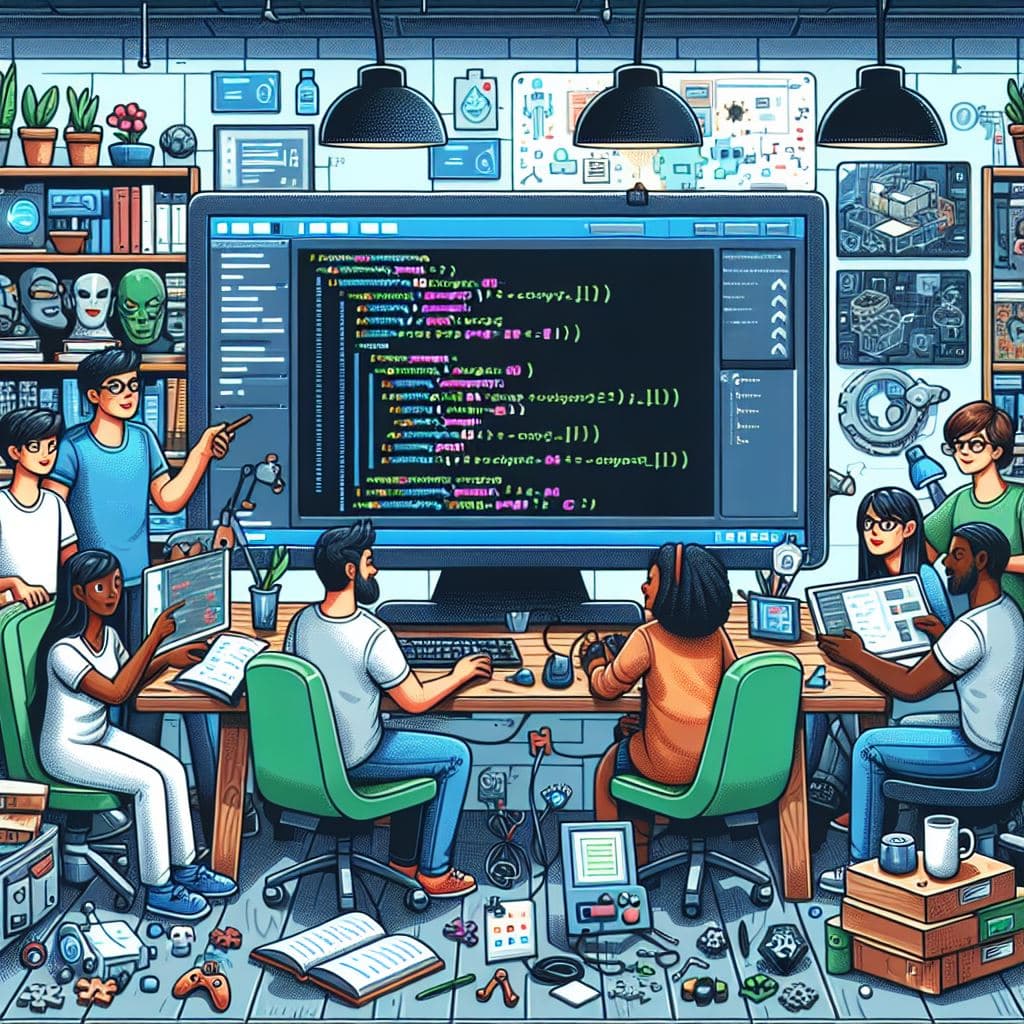Object-Oriented Programming (OOP) is a cornerstone of modern software development, and its role in game development is vital. Whether you’re using Unity, Unreal Engine, or another platform, understanding OOP principles can significantly elevate the way you design and implement game systems. This guide will take you through the basics of OOP in game development, real-world use cases, and practical examples to help you get started.
What Is Object-Oriented Programming (OOP)?
OOP is a programming paradigm centered around objects—data structures that encapsulate both data (attributes) and functionality (methods). By organizing your code into reusable and modular components, OOP helps simplify complex systems, making them easier to maintain, scale, and debug.
The Four Pillars of OOP
- Encapsulation: Grouping data and methods within a class to keep them organized and protected.
- Example: A Player class might have health and stamina as private attributes, with methods like
TakeDamage()orUseStamina().
- Example: A Player class might have health and stamina as private attributes, with methods like
- Abstraction: Simplifying complex logic by exposing only essential details through interfaces.
- Example: A weapon system could expose a simple
Fire()method without revealing the internal calculations for ammo reduction or recoil.
- Example: A weapon system could expose a simple
- Inheritance: Sharing and reusing code by deriving new classes from existing ones.
- Example: A Vehicle class could be a parent to Car, Bike, and Boat subclasses, inheriting movement methods but overriding specific behaviors.
- Polymorphism: Allowing methods to take on different forms depending on the context.
- Example: An
Attack()method might behave differently for melee and ranged weapons, even if they share the same base class.
- Example: An
Why Use OOP in Game Development?
Game development involves managing multiple systems like physics, AI, UI, and input handling. OOP’s modularity and reusability make it easier to manage these interconnected components. Here’s why it’s invaluable in game development:
- Code Reusability: Shared behaviors like movement or animations can be implemented once and reused across multiple characters or objects.
- Scalability: Adding new features or expanding a game world becomes easier with a well-structured OOP design.
- Maintainability: Debugging and updating code is simpler when related functionalities are encapsulated in modular classes.
How OOP Is Used in Game Engines
1. Unity
Unity employs C# as its scripting language, making it inherently object-oriented. Here’s how OOP principles manifest in Unity:
- Classes and Objects: Scripts in Unity are C# classes attached to GameObjects. Each script encapsulates specific behaviors or properties.
- Example: A
PlayerControllerscript manages player input and movement, while anEnemyAIscript handles enemy behavior.
- Example: A
- Inheritance in Unity: Base classes like
MonoBehaviourallow scripts to interact with Unity’s lifecycle methods (Start(),Update(), etc.).- Use Case: A base Weapon class can define shared attributes (damage, range), while subclasses like Sword or Gun implement unique behaviors.
2. Unreal Engine
Unreal Engine uses C++ and follows OOP principles. It also incorporates Blueprints for visual scripting, which align with OOP concepts.
- Encapsulation with Actors: Unreal’s
AActorclass serves as a base for most objects in the game world. You can create derived classes like PlayerCharacter or PickupItem.- Use Case: A PickupItem class might have a
Collect()method that triggers a score increase or inventory update.
- Use Case: A PickupItem class might have a
- Polymorphism in Unreal: Interfaces in Unreal allow for flexible interactions between unrelated objects.
- Example: Both Door and Chest could implement an
Interact()interface, allowing them to respond uniquely to player interaction.
- Example: Both Door and Chest could implement an
OOP Game Development Examples
1. A Character System in Unity
Imagine a game where you have different characters, each with unique abilities. You can use OOP to organize this system:
public abstract class Character : MonoBehaviour
{
public string CharacterName;
public int Health;
public abstract void SpecialAbility();
}
public class Warrior : Character
{
public override void SpecialAbility()
{
Debug.Log($"{CharacterName} uses Power Strike!");
}
}
public class Mage : Character
{
public override void SpecialAbility()
{
Debug.Log($"{CharacterName} casts Fireball!");
}
}
By creating a base Character class and extending it for specific character types, you can easily add new character classes later.
2. A Weapon System in Unreal Engine
In Unreal Engine, you might implement a weapon system using inheritance:
class AWeapon : public AActor
{
protected:
int32 Damage;
public:
virtual void Fire();
};
class AGun : public AWeapon
{
public:
void Fire() override
{
// Gun-specific firing logic
}
};
class ABow : public AWeapon
{
public:
void Fire() override
{
// Bow-specific firing logic
}
};
With this setup, adding a new weapon type only requires extending the AWeapon class and overriding the Fire() method.
3. AI Behavior System
Using OOP, you can design a flexible AI system:
- A base
Enemyclass defines general attributes like health and movement speed. - Derived classes like
ZombieorRobotoverride specific behaviors, such as how they attack or pursue the player.
This approach keeps your AI logic organized and allows for easy expansion with new enemy types.
Use Case: Building a Modular Game Framework
Consider a 2D platformer where you have enemies, pickups, and hazards. Here’s how OOP principles apply:
- Encapsulation: Each GameObject (player, enemy, platform) has its own script handling specific behavior.
- Inheritance: A base
Pickupclass defines shared behavior for items like coins and power-ups. - Polymorphism: The player interacts with pickups using a general method like
OnPickup(), which triggers unique effects based on the pickup type.
This structure ensures your game remains scalable and easy to manage.
Best Practices for OOP in Game Development
- Keep Classes Single-Responsibility: Each class should focus on one task, like managing health or handling player input.
- Favor Composition Over Inheritance: Use components to add functionality dynamically. For example, Unity’s component-based system allows objects to have multiple behaviors.
- Use Interfaces for Flexibility: In scenarios where unrelated objects need to share functionality, like interactable objects.
- Refactor Regularly: As your game evolves, revisit and improve your class structure to avoid technical debt.
Conclusion
Object-Oriented Programming is a game changer in game development. Its ability to organize, reuse, and maintain code simplifies the creation of complex systems, making it a must-learn skill for any game developer. Whether you’re building a simple 2D platformer or a massive open-world RPG, OOP principles will help you bring your ideas to life efficiently and effectively.



